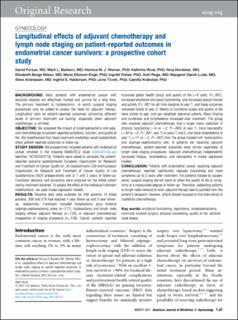| dc.description.abstract | Background: Most patients with endometrial cancer with localized disease are effectively treated and survive for a long time. The primary treatment is hysterectomy, to which surgical staging procedures may be added to assess the need for adjuvant therapy. Longitudinal data on patient-reported outcomes comparing different levels of primary treatment are lacking, especially when adjuvant radiotherapy is omitted.
Objective: We assessed the impact of lymphadenectomy and adjuvant chemotherapy on patient-reported symptoms, function, and quality of life. We hypothesized that these treatment modalities would substantially affect patient-reported outcomes at follow-up.
Study Design: We prospectively included patients with endometrial cancer enrolled in the ongoing MoMaTEC2 study (ClinicalTrials.gov Identifier: NCT02543710). Patients were asked to complete the patient-reported outcome questionnaires European Organization for Research and Treatment of Cancer Quality of Life Questionnaire C30 and European Organization for Research and Treatment of Cancer Quality of Life Questionnaire EN24 preoperatively and at 1 and 2 years of follow-up. Functional domains and symptoms were analyzed for the whole cohort and by treatment received. To assess the effect of the individual treatment modifications, we used mixed regression models.
Results: Baseline data were available for 448 patients. Of these patients, 339 and 219 had reached 1-year follow-up and 2-year follow-up, respectively. Treatment included hysterectomy (plus bilateral salpingo-oophorectomy) alone (n=177), hysterectomy and lymph node staging without adjuvant therapy (n=133), or adjuvant chemotherapy irrespective of staging procedure (n=138). Overall, patients reported improved global health status and quality of life (+9 units; P<.001), increased emotional and social functioning, and increased sexual interest and activity (P<.001 for all) from baseline to year 1, and these outcomes remained stable at year 2. Means of functional scales and quality of life were similar to age- and sex-weighted reference cohorts. Mean tingling and numbness and lymphedema increased after treatment. The group who received adjuvant chemotherapy had a larger mean reduction in physical functioning (−6 vs +2; P=.002) at year 1, more neuropathy (+30 vs +5; P<.001; year 1) at years 1 and 2, and more lymphedema at year 1 (+11 vs +2; P=.007) than the group treated with hysterectomy and salpingo-oophorectomy only. In patients not receiving adjuvant chemotherapy, patient-reported outcomes were similar regardless of lymph node staging procedures. Adjuvant chemotherapy independently increased fatigue, lymphedema, and neuropathy in mixed regression models.
Conclusion: Patients with endometrial cancer receiving adjuvant chemotherapy reported significantly reduced functioning and more symptoms up to 2 years after treatment. For patients treated by surgery alone, surgical staging did not seem to affect the quality of life or symptoms to a measurable degree at follow-up. Therefore, subjecting patients to lymph node removal to tailor adjuvant therapy seems justified from the patient’s viewpoint; however, efforts should increase to find alternatives to traditional chemotherapy. | en_US |

